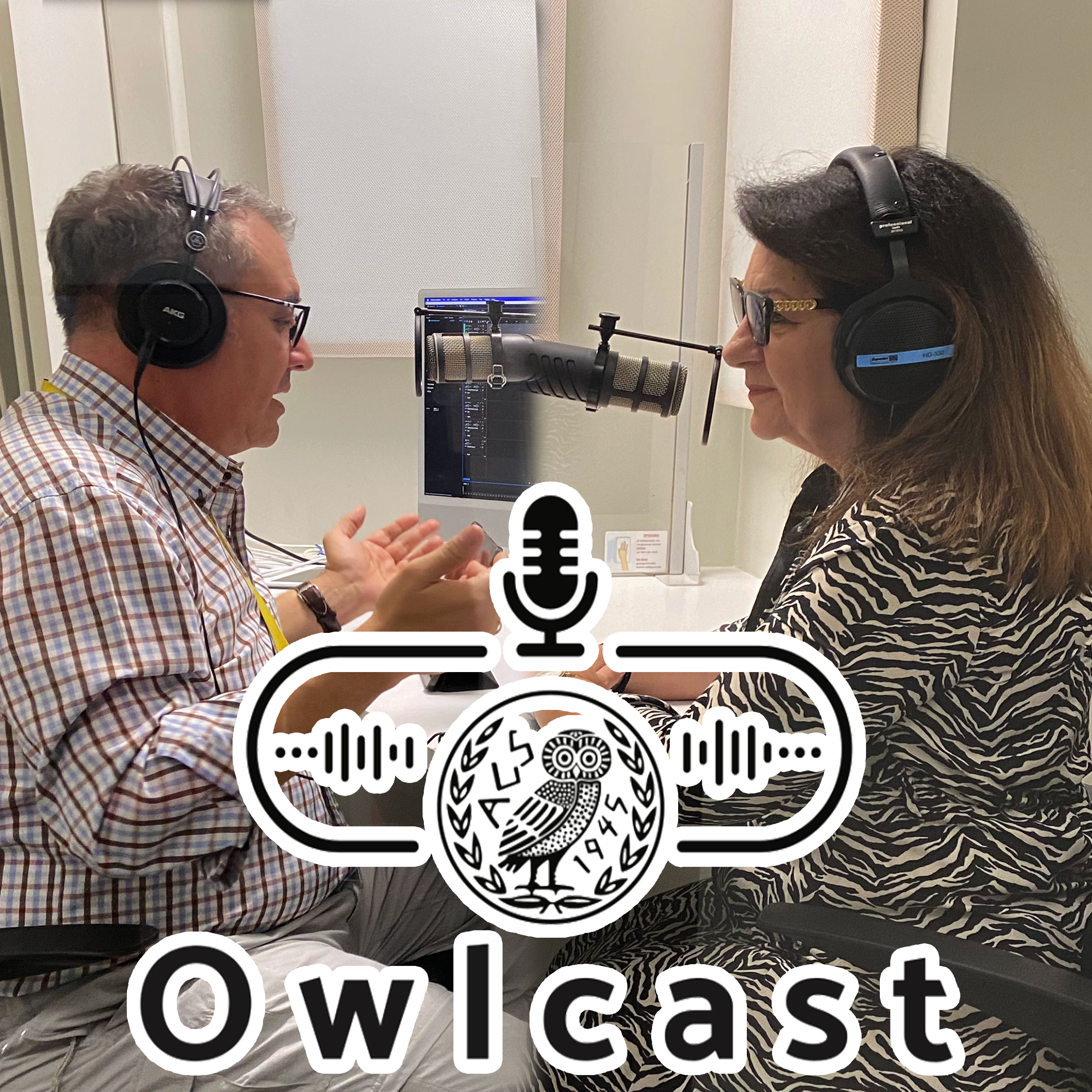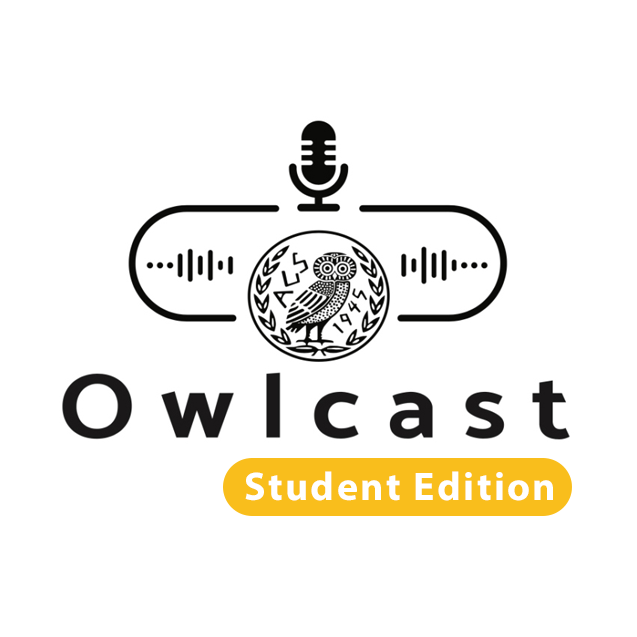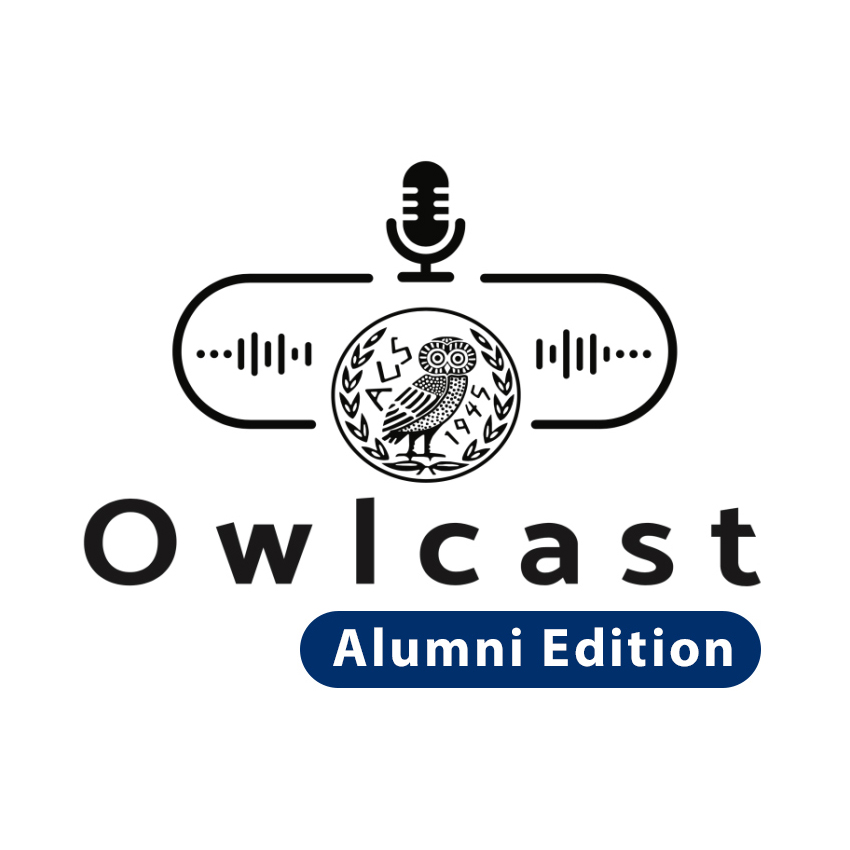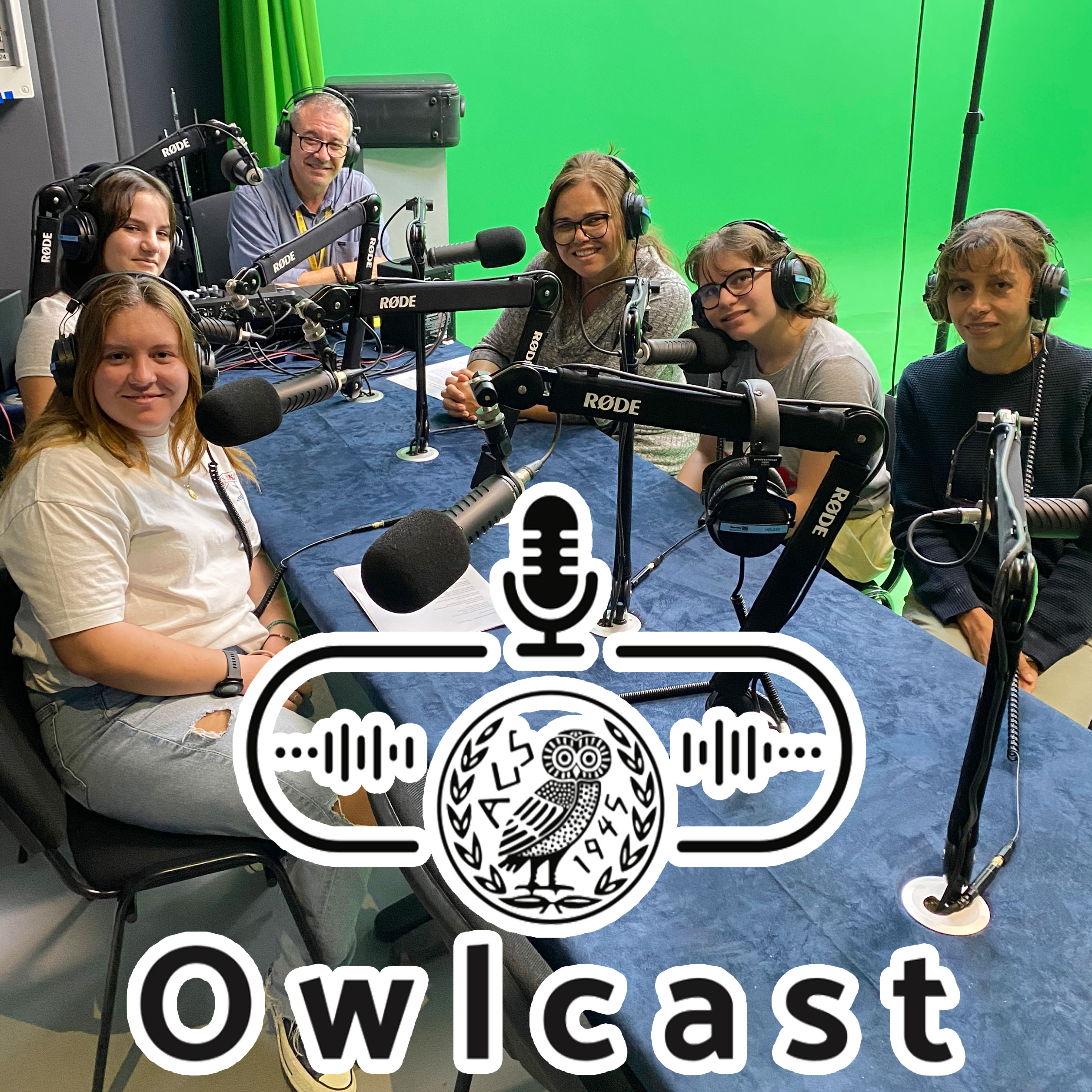Episode Transcript
Speaker 0 00:00:00 <silence>
Speaker 1 00:00:10 This is the Owl Cast, the official podcast of ACS Athens.
Speaker 0 00:00:17 Listen
Speaker 1 00:00:18 To the exciting story of the American Community Schools of Athens. Check out what drives all the members of our international community, of learners as we create the education of the future. Here's John Papadakis.
HOST 00:00:42 Welcome to the new season of the Outcast, the official podcast of ACS Athens. The new academic year 23-24 is underway, and everyone in the international community of the school returned or came for the first time to experience a unique model of education, which as our guest, fittingly says, is designed to lead our students to grow and develop as they enter the world. As every year, the inaugural episode of the season hosts the president of the school who sets the tone for the year and outlines her vision. This will be the fifth year that Dr. Pelonis leads ACS Athens. In her latest President's newsletter, Dr. Pelonis emphasized that as a school, we want all our students to be prepared because they will lead in tomorrow’s society. We don't have all the answers. In fact, by engaging in a dialogue, we hope that we will have more questions about how technology, tools, and machines can be designed to improve life and living. With Dr. Pelonis today, we discuss: moments from the past year that had an impact on the life of the students, students developing their personal leadership philosophy and observing leadership in action. The summer leadership course, the 2023 gala, developing the ACS Athens Global Alumni Network, and celebration of the achievements of our community; why academic excellence is not enough for success; the need for students to develop psychological muscle and resiliency; developing a purpose and internal locus of control through social engagement and community service; A fundamental question to new students and their family: Do you know who We are, the importance of the mission of the school; going to the next level, and the significance of an evolving vision and leading an educational institution, the successes, the challenges, and the personal growth.
HOST During the summer hiatus, when you had some time to reflect on the previous academic year and project on the new year, what moments stood out in your mind that made you say, I want to capitalize on these, build on them for the 23-24 year.
Dr. PELONIS 00:03:09 Students always and their projects. Um, we had so many people, kids come forward with innovative projects, ideas. Um, we had the opportunity to, for some students, to take a leadership course in Pennsylvania and then go to Washington DC and see leadership in action. All of those kids came back with incredible ideas to lead things in the school, lead projects. We had the opportunity to go to the Council of Europe and Strasburg, and for the kids to present a, a first time event that students actually presented at the Council of Europe. We had little, uh, kids in the elementary school, uh, coming up with projects for the sustainable development goals. So I say that when you turn over, um, issues, challenges to the students. First of all, they have all the right questions, but they also have the solutions. And if we empower that, um, we really develop mindsets of, uh, kids, you know, becoming problem solvers and developing also psychological muscle by, by being problem solvers so that they're not victims of change. So always capitalize on the students.
HOST 00:04:20 You mentioned the program in Widener. This is, I think the first one after many years that we were able to, uh, provide to the students due to C O V I D, but also due to other reasons. Did you talk to students who participated in the program? What were their impressions from that trip?
Dr. PELONIS 00:04:39 I not only spoke to them, but I had the opportunity to really observe the growth that took place within those two weeks at Widener University. You know, there are many universities and colleges that offer, uh, summer programs for students, but this particular one at Widener University is in partnership with us. And the leadership course was designed specifically for our students. Some students also took an engineering course, but during that time, they had the, the opportunity to develop their own leadership philosophy and set some goals the second week. Then we went to Washington, dc they saw leadership in action. And what was really interesting is, first of all, the growth that I saw within those two weeks, and the excitement and the maturity with which they dealt with, you know, our daily challenges, the way they handled and navigated, uh, their, some for some of them the first time being in the United States.
Dr. PELONIS 00:05:37 But also the comments from some of our guests that were ambassadors. You know, they were in charge of businesses, they were people from the capitol. The comments were at the level of, your students are so incredible, they're mature, their questions are amazing, and they're a group of people that we really enjoyed spending time with. So having these students come back now, they are going to be part of a leadership group in the school. They will initiate their own projects. And I think that doing that program at, at, uh, Weidner and then in DC empowered already, things that they, skills that they were developing, and I'm really, really proud of that.
HOST 00:06:20 Let's talk about the upcoming Gala. It's the 78th year of ACS Athens this year. And, uh, this is also an opportunity to celebrate the achievements of two distinguished alumni, the ACS Athens Global alumni community has always been a driving force of our community through their moral and material support, their innovative ideas and contributions. So what is the significance of this year's gala?
Dr. PELONIS 00:06:47 After all those years of C O V I D and different challenges that we have been through as a community, Ithink it's a time to celebrate, to come together, uh, as a community and, um, uh, all stakeholders, as many, you know, represented as possible. And I think it's just a chance to come together and enjoy the evening. Um, we have some great guest speakers and, um, dancing and music and just really celebrating the achievements, not only of the students, because some of our students here in the school will be performing and other things, but also of our, especially of our alums, because we are in the process of developing, as you know, very well, uh, our global platform. And in terms of developing a network out there where our students, uh, once they graduate, can see what opportunities are there for jobs, careers, uh, internships, all of these things.
Dr. PELONIS 00:07:42 It's a process that is a dynamic and constantly in place. And so I think that coming together to really celebrate these aspects of what a c s is all about, and bringing like-minded people together towards that end is gonna be a fabulous evening. I believe that, um, when people come together to celebrate and, um, when they acknowledge and really appreciate what, uh, the growth of the students and the transformation, I think that that that comes naturally and they wanna contribute to that. They wanna be part of that legacy. So whatever that contribution is is very welcomed. But ultimately the end, it will be to, uh, provide any kind of funds towards, um, renovating some of our laboratories. Our science laboratories, we have about four more that we wanna renovate and one state-of-the-art. We want to, you know, we want to have the state-of-the-art laboratories. And so that's where the funds will go.
HOST 00:08:39 And, uh, we're gonna be hearing from now until the gala, why it is important, the science of it to the students, because they're gonna be talking with us, uh, on why they think science is important and why they think that we should upgrade it. So it's gonna be interesting to hear their voices. Um, every week you send a reflective message to the community. In one of your first messages to the teachers this year you chose to talk about the word education. And as you said, the word has a Latin root, Educio, if I'm good with my Latin, which means to draw out, to develop from within, to lead someone to grow and develop and to lead them out into the world. Why was it important for you to point this out?
Dr. PELONIS 00:09:24 Because I wanted teachers and staff and everyone in the school to really focus on what they do, um, and acknowledge what they do. Everybody knows, you know, that they work towards a holistic education, but there's so many people on campus that make their pieces to the puzzle that eventually come together. So yes, you have faculty in the classroom, you have counselors, you have people in the offices, you have people, you know, even people like maintenance, who every day work really hard. Without them, we wouldn't be able to have some of the functions. We have all these pieces come together to create this community and contribute towards holistic education. And so I wanted them to really see that what they do is teach, yes, that's very important, but more importantly, mold, personalities, mindsets, and when they care about kids, which I think everybody on this campus really caress about kids, then we really empower kids to be the best that they can be. So I, it was my way of saying, wow, look at what you're doing
HOST 00:10:29 And why,
Dr. PELONIS 00:10:30 And why, and our why is very important. Absolutely.
HOST 00:10:34 In your latest newsletter to the community, you are talking about inspiring students to be problem solvers with psychological muscle resilient and solution seekers rather than victims of change. You already mentioned it, but I have to say it again. How can these qualities compare to the values of academic excellence as a prerequisite or the only prerequisite for success?
Dr. PELONIS 00:10:56 They go hand in hand. I think the, when students are, well, people, when we're, well, we, you know, we don't always have good days. We have bad days as well. But the idea is to be able to develop that psychological muscle so that when there are bad days, we know how to reach out for support. We get up and go again. Set goals, really, you know, focus on what is our, where do we wanna go, and how do we wanna develop? And one of the ways to do that, and I know from psychology from the past that social interest is a very strong component of building psychological muscle and social.
HOST 00:11:32 A motivator.
Dr. PELONIS 00:11:33 A motivator. And yes. And social interest is about, you know, giving, going outside of yourself to give to someone else, to a cause to another person. You know, it doesn't have to be something major, but it does have to be, you know, providing for someone else. I think it's important for people to understand is yes, it's good to, to provide for others who are lacking, who you know, to help contribute, to equal opportunities to community service. All of that, that's very good because it does good to the community and to others. However, the most good it does is to the self. Because you have a, you develop a purpose, you develop problem solving abilities, you develop psychological muscle and internal locus of control. And when that happens, you are always thinking about ways to improve, to change, to navigate, to problem solve. And you don't have time to be a victim, you know, of course, I'm not talking about victim of circumstances, I'm talking about the mentality of being a victim.
BREAK
Speaker 1 00:12:41 You are listening to the owl cast, the official podcast of ACS Athens,
HOST 00:12:52 Someone who's coming this year for the first time in the school, let's say an elementary student or the parent of the elementary student. Um, hearing you say these things, um, can you put a timeframe in their mind? When do you expect this student to develop this kind of psychological muscle, this resilience by the end of elementary school, by graduation, the, the same year? I mean, what is a relative timeframe
Dr. PELONIS 00:13:23 When an institution moves in the same direction towards that kind of a vision And we're all, let's say, rowing the boat in the same direction, and everybody speaks the language the same uses the, the, the language also creates reflective opportunities for students. And that connect and also connects them to community service projects or their own individual projects that they develop. It's a growth process that happens every single day. And the idea is for a student to be, or, and a person to be better today than we were yesterday, it's about transformation. It's about growth, and everybody wants to grow and transform. Everybody wants to develop a skill, more knowledge, you know, be able to navigate circumstances better. So I think it's a process daily, but when it's done with intention, the process take, it happens. Um, e easier and quicker. Now, how long will this take?
Dr. PELONIS 00:14:17 Well, the uniqueness of the individuals, where that comes to play, that's why we really stress the uniqueness of the student and understanding the student. So one student may do this very, very quickly. Another student may take more of their time, and sometimes it may not show until much later. But how are we continuing to develop these mindsets and living under in a community with so many different nationalities? Sometimes, you know, people will compare. It will tell me things, you know, in this school they do this and that school, they do that. And I'll say, but you know what? We're 64 plus nationalities. And navigating that under the same roof requires a certain kind of mindset, similar values, you know, moving in the same direction. It's a very different, you can't compare apples to oranges. So the, it's a process. And if we see growth and transformation, that's what's important.
HOST 00:15:08 And of course, uh, someone who's coming now to the school can see at least a level playing field. So we provide that. The individual is the wild card mm-hmm. <affirmative>. And we're trying to see how the playing field and the wild card can match for that vision that you just mentioned. So talking about vision, um, during the past four years of your presidency, the school has changed its vision, but with the same mission. Mm-hmm. <affirmative>. So how do you see your role in this dual nature? Same mission, different vision, what makes it or could be appealing to new students and parents?
Dr. PELONIS 00:15:49 The mission is who we are. So it defines who we are, and we always need to come back. These are the foundational documents that we talk about. And we always have to come back to, you know, for everyone to understand who we are. And that's why it's a question I ask many new parents, do you know who we are? Because if you know who we are, then you're coming in and you're going to, you know, be part of this journey and this process, but,
HOST 00:16:12 And can they be part of this journey…
Dr. PELONIS 00:16:13 And can they be part of it? And I think they can in many ways, and they contribute in their own way. And hopefully, you know, we're the messages are similar at home as well. So the mission is always who we are, and we always have to refer to that and say, are we doing what the mission says? The vision is where we want to go. And vision always, it, it, you know, every once in a while. And that's why it's changed, uh, during my presidency somewhat, because it's where we wanna go and it has to always evolve. We always have to go to the next level, have we accomplished this? Okay, then where do we go next? And what's the, and it might be a slight change, but with deep meaning. Uh, so are we still developing architects of their own learning and kids who are, you know, improving life and living on the planet who have that mindset because they're, they're living in that planet and they're, and we, so we are all living. And as a generation, I don't think we've done very well, uh, for our kids in terms of our planet. But, um, we have to help them and not leave it to them to fix it. We have to support them and encourage them and give them the tools to make it better.\
HOST 00:17:21 During this four year period, you must have changed on a more personal level. Would you like to reflect? I mean, what do you see when you look at the proverbial mirror?
Dr. PELONIS 00:17:33 That's a very good question. I, I realized that my background in psychology really has come in handy during some very challenging times. Uh, it's automatic, uh, you to be in this business. You really have to love kids and people. If you don't, it's not a business. You know? It's not what you don't, you can do. That's right. And I think I realized over time that, uh, there's a lot more management. Uh, so I have to make time for educational, uh, messages and, you know, intentional planning and strategic planning. Um, and have I grown as a person? Absolutely. I've been challenged in a lot of ways. Uh, but I feel that we have come together as a community in, in ways that I can't, I can't, I never expected. Um, you know, the, the strength of a community is obvious during celebrations, I say, but as well as challenges.
Dr. PELONIS 00:18:34 'cause in celebrations, if you can be happy for someone else's joy and you can come together and celebrate that, that's amazing. But also with, uh, challenges and we've had some major challenges and we have come together as a community and as a team, as a leadership team and I, and so I feel that that is our greatest strength. And that can't help but trickle down to the students. I think they feel it, they sense it, they say it. Are we always successful with every single student? Probably not. But I wanna believe that we are all doing the best that we can to help in that transformation process.
HOST 00:19:12 So finally, if you had to describe in five words or less your expectations from this new academic year, what would these words be?
Dr. PELONIS 00:19:22 Cohesion. Cohesion in everything. Communication, scope and sequence. Um, academics, you know, alignment, processes in the classrooms. Cohesion, I would say, um, collaboration via respect for differences. So really, uh, uh, appreciating all the differences, the people in the school and their mindsets. And 'cause we do have a lot of different nationalities, um, and mindsets and beliefs and ideas. And so how do we come together under this roof to make all of that work and say, okay, I may not agree with you, but you know what, I'm going to respect you and I'm gonna collaborate with you because that's what global citizens are all about. The other thing I wanna say is, um, continued community building. Community building is an important piece. And you know, we've grown as a school and it's not always possible to have people in and out of the school because obviously the safety of students comes first. But we do want to plan more events for that to happen. Celebrations, uh, celebrations and people to come together and parents to get to know one another and all of that. And the final one I would say is to really develop this network because the sense of pride that I oftentimes hear about, I mean, we have what an average of three alumna per week Hmm. That come to visit our school. We want to, we want to continue to have them connected across the world
HOST 00:20:48 And many more who are calling if they want to come and visit whenever they're here. Mm-hmm.
Dr. PELONIS 00:20:53 <affirmative>. Yeah. So this is an incredible resource out there that could really continue to connect our students and all of us as a community. So we're just a little school, that one end of the world. I say sometimes, but you know what? Good things come in small packages. So there you go,
HOST 00:21:11 About 165 words, but that's okay. <laugh>, it's an analysis here. You're psychologist, so I cannot argue with that. Dr. Pelonis, thank you so much.
Dr. PELONIS Thank you, Mr. Papadakis.
HOST Let's have a great academic year.
Dr. PELONIS 00:21:22 Looking Forward to it.
Speaker 1 00:21:26 You are listening to the All Cast, the official podcast of ACS Athens. Make sure you subscribe to the All Cast on Google Podcast, Spotify and Apple Podcasts. This has been a production of the ACS Athens Media Studio.



